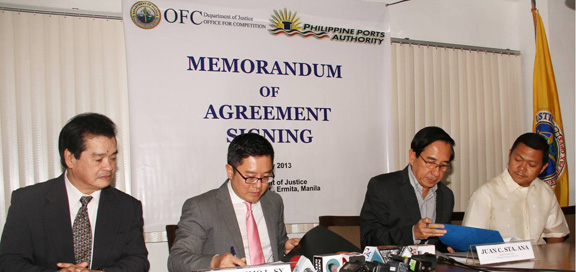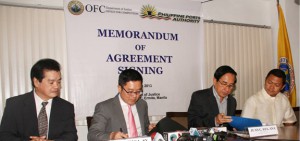

AFTER several fact-finding consultations, the Philippine Department of Justice’s (DOJ) Office for Competition (OFC) and the Philippine Ports Authority (PPA) last week signed a memorandum of agreement to address the port cargo congestion issue through “competition reforms.”
The PPA, together with the OFC, is set to issue a competitiveness action plan that aims to simplify business operations in ports, encourage competition and improve competitiveness of the country’s trade and industries that depend on seaborne export and import.
The MOA was dated June 28 but signed on July 1 by DOJ assistant secretary and OFC chief Geronimo Sy and PPA general manager Juan Sta. Ana.
Under the agreement, the DOJ, through the OFC, will “conduct a port sector study to look into the level of competition, port efficiency, and regulatory framework among others” and help the PPA prepare its competitiveness action plan.
The PPA, for its part, will help the DOJ conduct its port sector study and “prepare a competitiveness action plan which will contain measures and timeliness geared to enhance efficiency, transparency, competition in the port sector.”
Both agencies will meet regularly at least once every quarter to monitor the progress of the undertakings under the agreement and provide workshops and trainings to equip employees with knowledge on the matter.
The agreement will be subject to a yearly review and amendment and is valid until December 31, 2014.
“The time frame is 90 days for the assessment study. We’re about one-third into it… We will continue taking the facts on the ground to make sure that it will not just be a consultant type of project study or output, but it will be a government study that will have results,” Sy said during the signing.
Sta. Ana said he was hopeful reforms can be made and sustained in partnership with the OFC.
Sy said so many issues were involved. “The first is to get the issues a ground analysis,” he said.
“We haven’t studied the problems yet… It’s a whole chain we’re looking at… Initially we’re still fact-finding,” he added.
Asked why DOJ is pushing for the study, Sy said: “When we started a call for sector regulators to work with us, PPA responded. We have 65 regulators in the Philippines; we can’t work with 65, so the DOJ OFC has industry priorities – energy, transport and telcos. And (in) transport, the biggest, of course, is the port industry. So that’s how it started.”
The MOA was conceptualized by Sy and Sta. Ana during a port executive conference on April 17-19 this year. A day before, a forum on the Manila ports decongestion plan was held in Sofitel Plaza with industry stakeholders. Several meetings with stakeholders were held thereafter to form a basis for a study that would work out a doable solution to the issue.
The National Competitiveness Council, Japan International Cooperation Agency, and Joint Chamber of Commerce, among others, are recommending decongestion of Manila ports through compulsory cargo diversion to the underutilized Batangas or Subic ports.




